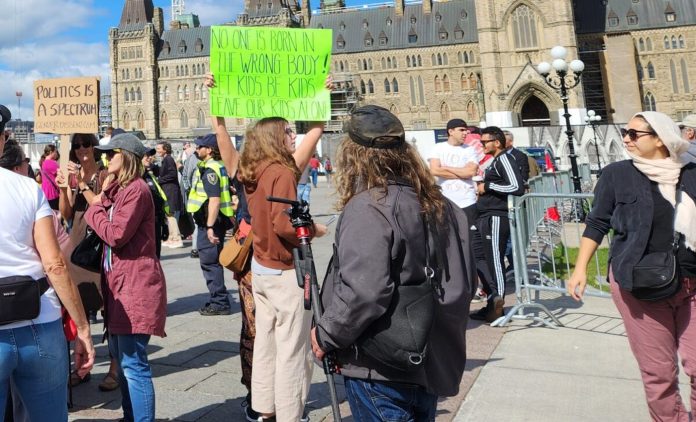
Katrya Bolger
Local Journalism Initiative Reporter
New Canadian Media
Tens of thousands of people rallied across Canada on Wednesday in sometimes emotional and heated competing protests relating to LGBTQ-inclusive school policies.
The rallies were organized by the “1 Million March 4 Children” group, which describes itself as bringing together people from “diverse backgrounds and faiths” to advocate against policies and extracurricular programs that allow for schools to teach children about “gender ideology” and sexuality.
Parents from many multicultural groups were among those attending the rally on Parliament Hill on Wednesday, Sept. 20. Those who spoke to New Canadian Media said they were attending the protest not because they oppose the LGBTQ community but because they want the school system to stop teaching gender identity and sexuality and to not promote educational content that goes against their traditional beliefs.
Maria, a Lebanese-Canadian protestor who requested that New Canadian Media not publish her last name, said the fact these topics are taught to her children at a young age clashes with her culture and beliefs. “It’s not about hating [LGBTQ people]. We do respect these people. It’s just we’re against the implications of this in the curriculum. We are here just to say no to sexualizing education.”
If these policies continue to be upheld, Maria says she would consider homeschooling her children or potentially even moving back to her native Lebanon, although her clear preference is to stay in Canada.
A protestor who came to Canada from Egypt more than a decade ago, said she would also consider leaving Canada if the curriculum is maintained. She expressed concern about her children being taught “sexual education” and exposed to mixed washrooms at their young age: “I’m worried about my kids,” said the protester, who didn’t want her name to be made public.
“I don’t want my kids to learn about [these types of things] this early. This is not a subject for the schools.” She added that she knows of several families in her community who are considering withdrawing their children from Canadian schools for the same reason.
The battle over LGBTQ school policies has been focused largely on the Sexual Orientation and Gender Identity (SOGI) curriculum, the teaching of pronouns and implementation of mixed bathrooms in school. Provinces have different approaches to implementing these measures.
Protests have broken out over recent months when Saskatchewan and New Brunswick put forward legislation that would require educators to secure a parent’s consent if a child wanted to use a different name or be called by a different pronoun at school. Ontario Premier Doug Ford has floated similar policies, but legislation has yet to be introduced in the province. Critics have said these policies violate children’s rights to privacy and equality.
Counter-protesters accused demonstrators of stopping students from learning about inclusion and acceptance of gender-diverse people. In Ottawa, the “1 Million March 4 Children” was met by counter-protests coordinated by Community Solidarity Ottawa (CSO), a group of local labour unions, community organizations and residents. In a statement, CSO said the march organizer’s push to remove policies such as trans-inclusive curriculums perpetuates anti-LGBTQ beliefs.
Kelly Ernst, president of Calgary’s End of the Rainbow Foundation, works with LGBTQ refugees and asylum seekers to support their integration into life in that city. He says the anti-LGBTQ policy protests are troubling for Canada’s reputation as an inclusive society.
“Canada has a reputation for respecting the dignity of all people and respecting human rights for everyone…[But these policies] truly do erode not only Canada’s reputation – they also instill additional fear in people that have already experienced that persecution,” Ernst said from Calgary.
Ernst suggests that the recent protests are based on a belief that “there’s some sort of indoctrination of children to be different…But what’s in the curriculum in Canada is to respect one another and treat people equally and to live that within the curriculum as well.”
Hate crimes against the LGBTQ community are on the rise in Canada. According to Statistics Canada data, hate crimes towards people over their sexual orientation rose by 64 per cent over the past year.
Ottawa police said they arrested two people for “inciting hatred” by “displaying hateful material” during the “1 Million March 4 Children” rally. Police reported additional arrests in Victoria and Halifax.
For Ernst, who works closely with LGBTQ refugee and asylum seekers, it is important for Canada to not become complacent when it comes to these rights: “I saw the [tide of anti-LGBTQ sentiment] coming a number years of ago in Canada…It’s a sense of privilege that people get here and a sense of invincibility that our rights can’t be taken away. And actually, they can be.”

